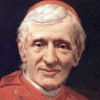Lead, kindly Light, amid the encircling gloom,
Lead Thou me on;
The night is dark, and I am far from home;
Lead Thou me on!
Keep Thou my feet; I do not ask to see
The distant scene; — one step enough for me.John Henry Newman (1801-1890) English prelate, Catholic Cardinal, theologian
“Lead, Kindly Light” (16 Jun 1833)
(Source)
Quotations by:
Newman, John
It is as absurd to argue men, as to torture them, into believing.
John Henry Newman (1801-1890) English prelate, Catholic Cardinal, theologian
“The Usurpations of Reason,” Sermon, Oxford, England (11 Dec 1831)
(Source)
Never… think we have a due knowledge of ourselves till we have been exposed to various kinds of temptations, and tried on every side. Integrity on one side of our character is no voucher for integrity on another. We cannot tell how we should act if brought under temptations different from those we have hitherto experienced.
Nothing would be done at all if a man waited until he could do something so well that no one could find fault with it.
In a higher world it is otherwise, but here below to live is to change, and to be perfect is to have changed often.
John Henry Newman (1801-1890) English prelate, Catholic Cardinal, theologian
An Essay on the Development of Christian Doctrine, ch. 1, sec. 7 (1845)
(Source)
Growth is the only evidence of life.
John Henry Newman (1801-1890) English prelate, Catholic Cardinal, theologian
Apologia Pro Vita Sua, ch. 1 (1879)
(Source)
A favorite phrase of his, which he felt was drawn directly from the work of Thomas Scott.
There is no rule about what is happy and good; what suits one would not suit another. And the ways by which perfection is reached vary very much; the medicines necessary for our souls are very different from each other. Thus, God leads us by strange ways; we know He wills our happiness, but we neither know what our happiness is, nor the way.
Certainly, if I am obliged to bring religion in to after-dinner toasts, (which indeed does not seem quite the thing) I shall drink — to the Pope, if you please, — still, to Conscience first, and to the Pope afterwards.
John Henry Newman (1801-1890) English prelate, Catholic Cardinal, theologian
Reply to Mr. Gladstone’s Pamphlet [Letter to the Duke of Norfolk], sec. 5 “Conscience” (1875)
(Source)
A man may hear a thousand lectures, and read a thousand volumes, and be at the end of the process very much where he was, as regards knowledge. Something more than merely admitting it in a negative way into the mind is necessary, if it is to remain there. It must not be passively received, but actually and actively entered into, embraced, mastered. The mind must go half-way to meet what comes to it from without.
John Henry Newman (1801-1890) English prelate, Catholic Cardinal, theologian
The Idea of a University, Lecture 9 “Discipline of Mind,” sec. 4 (1852)
(Source)
We can believe what we choose. We are answerable for what we choose to believe.
John Henry Newman (1801-1890) English prelate, Catholic Cardinal, theologian
Letter to Mrs. William Froude (27 Jun 1848)
(Source)
In C. S. Dessain (ed.), Letters and Diaries of John Henry Newman, vol. 12 "Rome to Birmingham" (1961).
I think I am very cold and reserved to people, but I cannot ever realise to myself that anyone loves me. I believe that is partly the reason, or I dare realise it.
John Henry Newman (1801-1890) English prelate, Catholic Cardinal, theologian
Letter to Rev. J. Keble (27 Aug 1837)
(Source)

